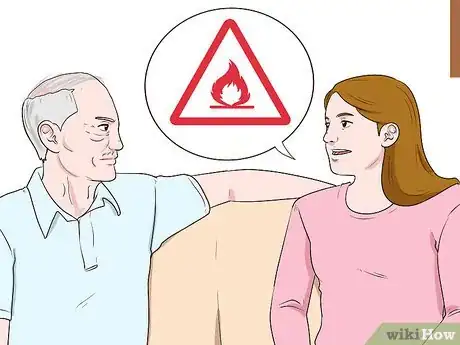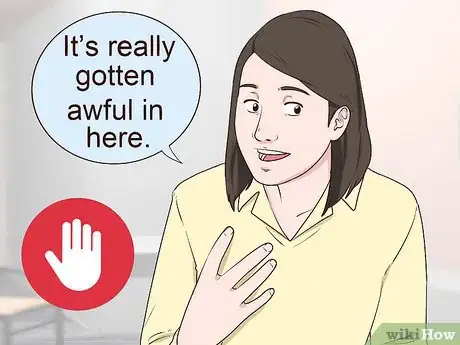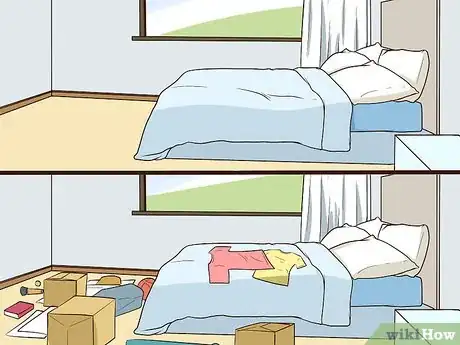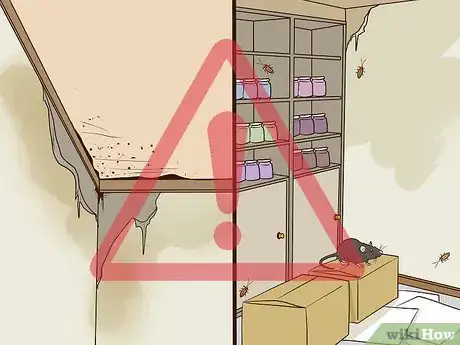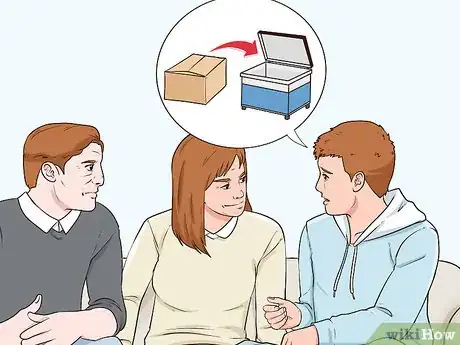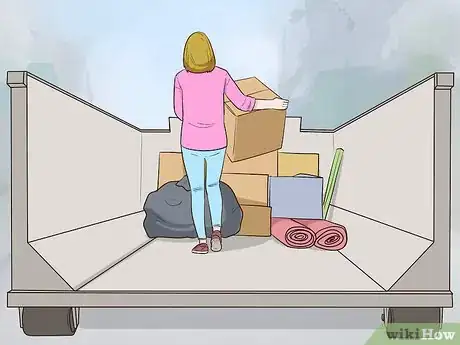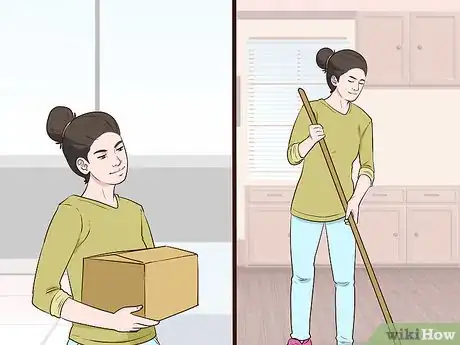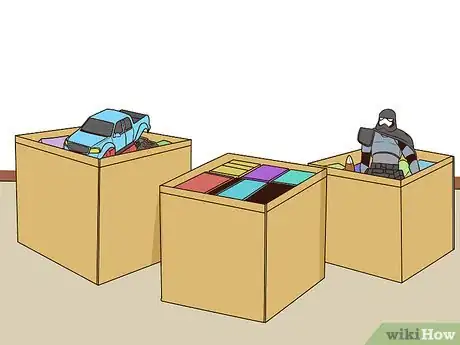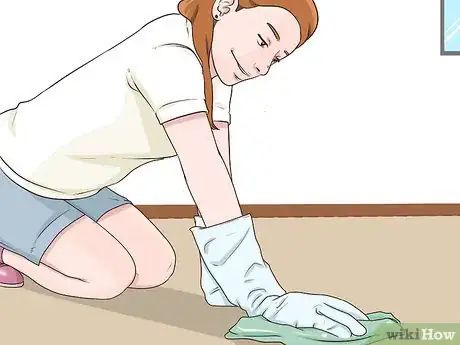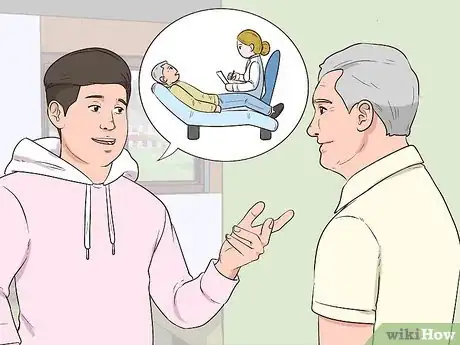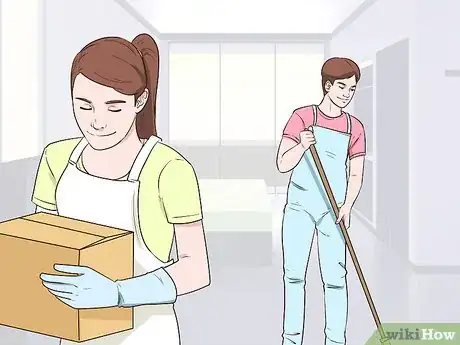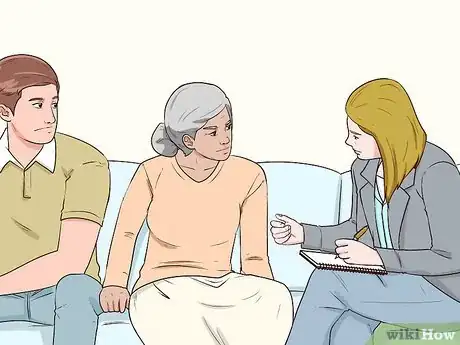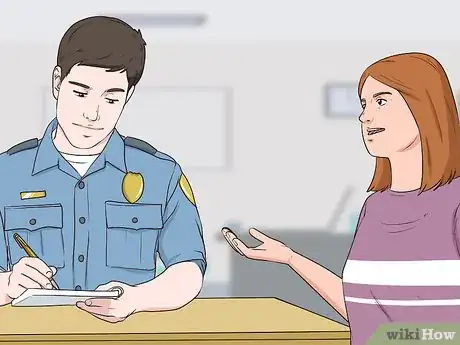This article was co-authored by Natalia S. David, PsyD. Dr. David is an Assistant Professor in Psychology at the University of Texas Southwestern Medical Center and a Psychiatry Consultant at Clements University Hospital and at Zale Lipshy University Hospital. She is a member of the Board of Behavioral Sleep Medicine, the Academy for Integrative Pain Management, and the American Psychological Association’s Division of Health Psychology. In 2017, she received the Baylor Scott & White Research Institute’s Podium Presentation Award and scholarship. She received her PsyD from Alliant International University in 2017 with an emphasis in Health Psychology.
There are 16 references cited in this article, which can be found at the bottom of the page.
This article has been viewed 165,018 times.
Do you have a parent who never throws anything away? If your parent hoards, you might be justifiably worried about their safety and quality of life. Plus, if you live under their roof, you might also be worried about your own well-being. You can’t force a hoarder to change their habits, but there are plenty of ways you can help your parent if they’ll let you. First, talk with your parent about the problem. If they’re ready to make a change, it’s time to tackle the house. After that, help your parent find a long-term solution by looking for outside support.
Steps
Raising Your Concerns
-
1Express your concern. Tell your parent that you’re worried about them. Point out any health hazards in their house. If you are living in the home, explain how their hoarding affects you.[1]
- For instance, you could say, “Dad, I’m concerned about your quality of life here. It’s hard to get from one room to another, and all these papers are a fire hazard.”
- If their hoarding affects you, say so. You might say, "I'm too embarrassed to invite friends over and I get picked on at school because of how our yard looks." Or, "I'm worried social services will come and take me and my sister away if this doesn't get better."
-
2Avoid being judgmental. Hoarding is a serious mental health issue, and what you may see as garbage might be something your parent regards as valuable or sentimental. Don’t say anything like, “It’s really gotten awful in here,” or, “How can you live in this place?” Remember that your parent sees their clutter differently than you do, and if you’re critical or harsh about it, they may not listen to anything else you have to say.[2]
- Use a neutral word like “stuff” or “things” for your parent’s possessions, not “junk.”
- If you're living there, stick to the facts about how it affects you rather than dwelling about it being "gross" or "inappropriate."
Advertisement -
3Offer to help. Tell your parent you want to help them clean up their place. Ask them what they’re having trouble with and how you could help them best. If you live in the home, you may have already spotted places where clutter is out of control. Offer to start there.
- If you live outside your parent's home, say something like, “I’d like to help you make more of your living space usable again. How would you like me to start?”
- If you live there, you might say, "I'd love to be able to have a barbecue. How about we start clearing out the yard so friends and family can come over? I'm happy to help."
-
4Accept that your parent may not be willing to change. Your parent might deny they have a problem or reject your offer to help. If they aren’t in immediate danger, there’s not much you can do. Let them know that your offer still stands if and when they decide to make a change.[3]
- If you don’t feel comfortable visiting your parent at their house, set a boundary that you’ll only visit in a neutral place, like a park or restaurant.
- If you are concerned about safety because of your parent’s hoarding, then you may want to encourage them to seek professional help to make the environment safe again.
Determining the Extent of the Problem
-
1Evaluate the problem. Check out your parent’s house and look at how bad their hoarding problem is. Notice whether rooms are being used for their intended purpose, whether surfaces and furniture are clear or covered in clutter, and whether there are any sanitation problems in the house, such as rotten food or pests.
- Take note of structural or fire hazards like floors caving because of excess weight or clutter piled near heaters or appliances.
-
2Know how to recognize mild problems with hoarding. Mild hoarding is usually easier to deal with, but it may escalate to more severe hoarding if left unchecked. That is why it is important to seek professional help as soon as possible. Hoarding can be divided into five levels of severity. These first two levels reflect minimal severity.[4]
- The first level indicates no hoarding tendencies. Clutter is minimal and the house is sanitary.
- Level two indicates a mild hoarding problem. Look for signs like a doorway that’s blocked by clutter or a broken appliance. Other indications include small amounts of dust and mildew on surfaces, at least two rooms with significant clutter, and a mild to moderate rodent or insect problem.
-
3Notice signs of moderate hoarding. Level three indicates moderate hoarding. At this level, clutter is visible on the porch or in the yard. There are pathways through the clutter in the house and significant sanitation problems, such as overflowing garbage bins and pet accidents.[5]
-
4Be aware of severe forms of hoarding. The last two levels of hoarding are extreme and require immediate action. Allowing your parents to continue to live this way may be hazardous to their health.[6]
- Level four hoarding involves structural damage to the house, such as damaged walls and mold problems. The person may have too many pets. Health hazards like rotting food, pest infestations, and pet feces are present.
- Level five hoarding renders the house unlivable. There may be no water or electricity. The house contains fire hazards or hazardous materials. Insects, rodents, and other animals may be living in the house.
Getting Rid of Clutter
-
1Get your parent’s permission before you get rid of anything. Even meaningless items may have sentimental value to a hoarder. Respect your parent’s freedom to do whatever they like with their stuff, whether or not you agree, and don’t throw anything out until they give you permission.
- Even if you live with your parents, you should still respect their possessions. Have them sit down with you and create a list of things you can start getting rid of.
- Making a contract with your parent can also be helpful. For example, you may promise that they can keep 1 item out of every 10 items. This may help them to be more conscientious about the value of their belongings.
- Sometimes it may even be helpful for the parent to go away for a few days while the house is being cleaned. Offer to send them on a short vacation or to put them up in a hotel for a few days if you are able.
-
2Enlist other family members’ help. Don’t try to tackle a hoarder’s house alone. Get other family members or friends to help you, if possible. If you live in the home, reach out to adult family members and encourage them to talk to your parents.[7]
- You might say, "Aunt Pam, I'm really worried about Mom and Dad's hoarding. There's hardly any room to move around in our house. Can you talk to them and maybe help us clear out some of the clutter?"
- A professional cleaning service is another option, although these can be expensive. Costs will vary based on where you live, how much space you need cleaned (i.e. square footage) and the severity of the clutter.[8]
-
3Use a dumpster service. You will probably have to throw out more stuff than you expect. Arrange to have a dumpster dropped off as close to the house as possible. When your parent gives you permission to throw something out, take it to the dumpster right away so they can’t change their mind.
- Keep in mind that electronics and hazardous materials usually can’t go in dumpsters.
- Renting a dumpster can range from about $100 to $800, depending on how large a container you need and how long you need it.[9]
- If you can't afford to hire a dumpster service, ask friends and family if they have trucks or trailers to help you haul items to a nearby dump or recycling plant.
-
4Tackle one room at a time. Before you start cleaning, make a plan. Work on clearing one area before you move on to another. You’ll be able to see your progress more easily that way.[10]
- It might be best to start in areas with the least clutter and then build up to more congested areas.
-
5Sort items as you go. Divide items into three categories – things to keep, things to donate, and things to throw away. Take trash to the dumpster immediately. Have bins or bags ready for items to be donated. Don’t let your parent deliberate too long over what to do with things, or they might change their mind about getting rid of them.[11]
- You might give a time limit of about five minutes for them to deliberate on an item. Thinking on it too long will only allow them to come up with more reasons to keep things.
-
6Get as much done in one session as you can. Short cleaning sessions won’t make much of a dent in your parent’s clutter. Plan to clean all day, or at least for several hours, so you’ll actually make some progress.[12]
- Your parent will probably clutter their living area again when you leave, so short cleaning sessions may not do any good in the long run.
Finding Outside Help
-
1Encourage your parent to see a doctor. If your parent is willing to address their hoarding behavior, a trip to the doctor is a good place to start. A doctor can refer your parent to a mental health specialist. They can also check for problems like dementia, which can cause hoarding.[13]
- Offer to accompany your parent to the doctor’s office if they’re nervous about going.
- If you are a minor, you might ask a trusted adult to accompany your parent to the doctor.
-
2Encourage your parent to get therapy. Cognitive behavioral therapy is the most common treatment for hoarding behavior. Tell your parent that therapy will help them figure out why they hoard things and learn some healthier behaviors.[14]
- If you live in the home, your parent's hoarding is probably greatly affecting you. It may be a good idea to attend family therapy in such situations so you can discuss how to overcome the issue as a group.
- If you are a minor, talk to your school counselor. This person can probably refer you to a specialist in your area.
-
3Consider hiring someone. If your parent still has trouble keeping their house neat and sanitary, bringing in a professional might help. A cleaning service can help keep your parent’s house livable after you clean out the clutter. If you’re worried about your parent’s eating habits, consider a service like Meals on Wheels.
- You may be able to hire a professional cleaner to come in once a week to maintain the home after you've cleared away clutter. These professionals may charge $25 to $35 per hour to clean plus additional costs for the size of the home.[15]
- Locate a cleaner by doing a quick Google search for professionals in your local area.
-
4Have your parents' cognitive functioning assessed. Some people may begin to hoard as a result of an age-related issue. If you think your parent may be dealing with some kind of age-related problem, like physical limitations or cognitive decline, assisted living is another potential solution.[16]
- You may be able to have them evaluated by a psychiatrist or psychologist to determine if they are able to continue living on their own or if they should be moved to an assisted-living facility.
- Prices for psychological evaluations vary by area. If your parent has insurance that covers mental health treatment, part of the costs of the evaluation may be covered by insurance.
- Ask the provider to help you explain the process to your parent and describe what the results of the evaluation mean. If they need to move to an assist-living facility, get the psychologists help in locating resources and making decisions.
-
5Contact the authorities. You may be able to take legal action against your parents' hoarding problem. If you think your parent may be in danger because of their surroundings, you may have to get the fire marshal or their landlord involved.[17]
- Expect that your parent may become angry with you if you involve the authorities. However, if you have tried everything else with no success, involving the authorities may be your last resort.
- If you are a minor, you might have to ask an adult, such as an older sibling, relative, or family friend to call the authorities on your behalf.
- In such cases, you may be forced to stay in a foster home while the authorities decide on a place for you to live.[18]
References
- ↑ http://www.ageuk.org.uk/health-wellbeing/keeping-your-body-healthy/hoarding/
- ↑ http://www.huffingtonpost.com/ann-brenoff/is-your-mom-or-dad-a-hoarder_b_1365521.html
- ↑ http://www.nextavenue.org/my-father-hoarder/
- ↑ https://brownbirddiaries.wordpress.com/2017/06/03/dealing-with-an-elderly-hoarder/
- ↑ https://brownbirddiaries.wordpress.com/2017/06/03/dealing-with-an-elderly-hoarder/
- ↑ https://brownbirddiaries.wordpress.com/2017/06/03/dealing-with-an-elderly-hoarder/
- ↑ https://www.psychologytoday.com/blog/the-teen-doctor/201306/my-mother-is-hoarder
- ↑ https://www.clutterhoardingcleanup.com/hoarding-cleanup-costs/
- ↑ https://www.angieslist.com/articles/dumpster-rental-vs-junk-removal-pros-and-cons.htm
- ↑ https://myageingparent.com/care/care-options/how-to-help-older-people-with-hoarding-problems/
- ↑ http://www.caregiverstress.com/aging-issues/senior-hoarding/senior-hoarding-issues/
- ↑ https://www.visitingangels.com/handling-senior-hoarding-amp-self-neglect-article_202
- ↑ http://www.nhs.uk/Conditions/hoarding/Pages/Introduction.aspx#what-to-do
- ↑ http://www.mayoclinic.org/diseases-conditions/hoarding-disorder/diagnosis-treatment/treatment/txc-20317516
- ↑ http://www.homeadvisor.com/cost/cleaning-services/hire-a-maid-service/
- ↑ https://www.ncbi.nlm.nih.gov/pubmed/26474146
- ↑ http://www.nytimes.com/2013/05/27/health/when-hoarding-morphs-into-a-safety-hazard.html
- ↑ http://www.psychiatrictimes.com/obsessive-compulsive-disorder/hidden-lives-children-hoarders
About This Article
Dealing with a parent who hoards can be hard at times, but there are ways you can support them. If you haven’t already, sit down with your parent and gently express your concern that they have an issue with hoarding. Try offering to help them work through their possessions and clean some space. If they’re willing, take it slowly one room at a time so they don’t get overwhelmed. Don’t get rid of anything without their permission, since this can distress them. If your parent isn’t willing to get rid of anything, you can encourage them to get therapy to help them feel better and work through their insecurity. If they deny having a problem or refuse to change, just support them the best you can until they're ready to ask for help. For more advice from our Mental Health co-author, including how to identify different levels of hoarding, read on.
